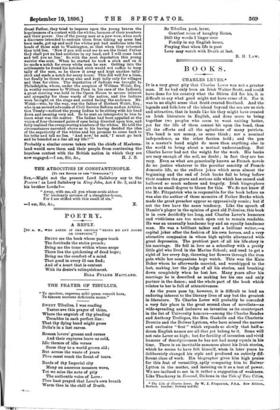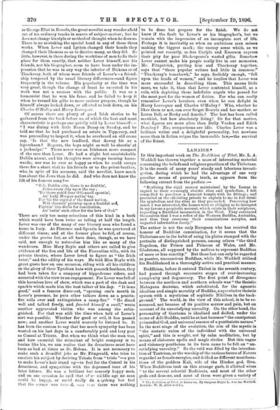BOOKS.
CHARLES LE V E R.*
IT is a very great pity that Charles Lever was not a greater man. If he bad only been an Irish Walter Scott, and coula have done for his country what the Shirra did for his, it is difficult to say what good might not have come of it. For it was in no slight sense that Scott created Scotland. And the- legends and folk-lore of the island beyond the sea are so rich' and attractive, that in hands like his they might have created an Irish literature in English, and done more to bring. together two peoples who seem to want uniting better, yet for the life of them cannot hit upon the bond, than all the efforts and all the agitations of many patriots. The bond is not money, as some think ; nor a nominal independence, as the other faction hold ; and the pert in a master's hand might do more than anything else in. the world to bring about a mutual understanding. But Charles Lever had not the weight for the work. His books are racy enough of the soil, no doubt ; in fact they are toe racy. Even as what are generically known as French novels do no justice whatever to the peculiar sanctity of French• domestic life, so the endless jokes which seem almost the beginning and the end of Irish books fail to bring before their readers the grave and serious side which has caused and hallowed so much sadness and tragedy. Irish biographers are in no small degree to blame for this. We do not know if the Mr. Fitzpatrick who is responsible for the book before us was also the author of those memoirs of Father Burke which made the great preacher appear so oppressively comic ; but if not the two have the same tendency. Like the speech of Hamlet's player in the opinion of good old Polonius, this book is in ours decidedly too long, and Charles Lever's humonra and v'itticisms are too much spun out to remain readable. He was an unusually handsome boy and an equally handsome man. He was a brilliant talker and a brilliant writer,—a capital joker after the fashion of his own heroes, and a very attractive companion in whom high spirits alternated with. great depression. The prettiest part of all his life-story is his marriage. He fell in love as a schoolboy with a pretty little girl who lived in the Marine School; and used to get a sight of her every day, throwing her flowers through the iron gate while her companions kept watch. This was the Kate- Baker whom he afterwards married, and worshipped to the last, making her the judge of all his stories, and breaking down completely when he lost her. Many years after his marriage he is described as making her his one and only partner in the dance ; and the whole part of the book which relates to her is full of attractiveness.
As the years pass by, however, it is difficult to lend an enduring interest to the literary lives of any but the greatest in literature. To Charles Lever will probably be conceded a very fair place in the great second class of novelists—as wide-spreading and inclusive an invention as its counterpart in the list of University honours—among the Charles Reades and Anthony Trollopes, the Mrs. Gaskells and the Charlotte Brontës and the Bulwer Lyttons, who have missed the narrow and exclusive " first " which expands so slowly that half-a- dozen English names are all that yet belong to it. Some will not rate Lever so high ; but for fertility of invention and vivid humour of descriptiveness he has not had many equals in his time. There is an inevitable sameness about his Irish stories, which he seems to have felt himself, when in later years he deliberately changed his style and produced an entirely dif- ferent class of work. His biographer gives him high praise for this feat of versatility, aptly comparing him to Bulwer Lytton in the matter, and insisting on it as a test of power- We are inclined to see in it rather a suggestion of weakness. Like Thackeray in Esmond, Dickens in the Tale of Two Cities, • The Life of Charles Lever. By W. J. Fitzpatrick, F.S.A. New Edition., Revised, London: Downey and Co. sr George Eliot in .Romola, the great novelist may wander afield cut of his ordinary tracks in search of subject-matter; but he does not change his style or method of thought when he does so. There is no mistaking the special hand in any of these three works. When Lever and Lytton changed their hands they changed their likeness so as to deceive many, as they did. So little. however, is there during the worktime of men to fix their place for them exactly, that neither Lever himself, nor his friends, nor his biographer, seem to have been under the im-' pression that he was in any way the inferior of Dickens or of -Thackeray, both of whom were friends of Lever's—a friend-
ship tempered by the usual literary differences—and figure
frequently in the volume. His popularity at the time was very great, though the change of front he executed in his work was not a success with the public. It was as a humourist that he won his fame, and be failed to keep it when he turned his gifts to more serious purpose, though he himself always looked down, or affected to look down, on his 'Charles O'Malley and Harry Lorreguer.
Of course there are plenty of good Irish stories to be gathered from the book before us, of which the best and most characteristic is perhaps one quietly told by Lever himself : — 41 I was dining with little Baron Deasy on Sunday, and he told me that he had purchased an estate in Tipperary, and
was proceeding to inspect it, when he overheard an old crone say, ' Is that the new landlord, that dawny bit av a leprechaun P Begorra, the boys might as well be shootin' at a jacksuipe." There never was an Irishman more compact of the race than Lever. He bad a slight but unmistakable Dublin accent, and his thoughts were always turning home- wards ; nor was he ever so happy as when he could escape there for a short visit to his friends or to the priest-brother, who, in spite of his sermons, said the novelist, knew much less about the Jews than he did. And who does not know the lilt of his famous song ?—
" Och, Dublin city, there is no doubtin',
Bates every city upon the say ; 'Tis there you'd hear O'Connell spoutin', An' Lady Morgan makin' tay.
For 'tis the capital o' the finest nation, Wid charmin' pisintry upon a fruitful sod, Fightin' like divils for conciliation, An' hatin' each other for the love of God."
There are only too many selections of this kind in a book which would have been twice as telling at half the length. Lever was one of the many of our literary men who found a home in Italy. At Florence and Spezzia he was quartered at different times; and at the former place be fell, of course, under the genius loci, as all have done, though, as we have said, not enough to naturalise him like so many of the
wanderers. Miss Mary Boyle and others are called to give evidence of the fun and life of the Florentine villa, with its private theatre, where Lever loved to figure as "the Irish tutor," and the oddity of his ways. He told Miss Boyle with great gusto how on one occasion, riding with all his children
in the glory of their Tyrolean hats with peacock feathers, they
had been taken for a company of hippodrome riders, and accosted with the view to an engagement. For Lever was fall of this harmless love of show, which was a part of the dash and sparkle which made him the best talker of his day. " It is no good," said a famous diner-out, " opening one's month in Lever's presence, he puts other talkers down as a prairie- fire rolls over and extinguishes a camp-fire." " He dined
well and talked freely, and fancied himself a swell," wrote another aggravated victim who was among the extin-
guished. For that was still the time when talk of Lever's sort was possible. Whether for good or evil, it has passed now; and another Lever would scarcely be listened to. It has been the custom to say that too much sympathy has been wasted on his last days in a comfortably paid and lazy post as Consul at Trieste. But when we think what the man was, and how essential the stimulant of bright company is to
brains like his, we can realise that its dreariness must have been as bad at times as St. Helena. It is not necessary to make such a dreadful joke as Mr. Fitzgerald, who tries to emulate his subject by deriving Trieste from " triste "—a pun to make Lever's hair stand up—to feel for the Consul in his dreariness, and sympathise with the depressed tone of his later letters. He was a brilliant but scarcely happy man, and on one occasion he said that af'er mi Idle age no man could be happy, or could rainy do a tything but feel that the corner was thin d, anti tl at there was nothing to be done but prepare for the finish. We ao nit know if the fault be Lever's or his biographer's, but we remain with the impression of an incomplete sort of life. Perhaps it is inevitably so when an ambitious man mind; making the biggest mark; the uneasy sense which, as we pointed out recently, makes Carlyle and Emerson expresii their pity for poor Shakespeare's wasted gifts. Somehow Lever cannot make his people really live in our memories. Mr. Fitzpatrick, putting him and Thackeray together, says that "these popular writers had little in common." " Thackeray's tomahawk," he says, foolishly enough, "fell upon the heads of women," and he implies that Lever was more successful in describing them. This means little more, we take it, than that Lever contented himself, as a rule, with depicting those indefinite angels who passed for the most part for the women of fiction. For who can really remember Lever's heroines, even when he can delight in Harry Lorrequer and Charles O'Malley P Who, whether he likes them or not, can ever forget Beatrice and her mother, or Laura Bell, or Becky and Amelia? The last has been called mawkish, but how absolutely living ! Or for that matter, what figures are more alive than Dolly Varden and Edith Dombey P No; comparisons are idle. Charles Lever was a brilliant writer and a delightful personality, but nowhere more than in fiction reigns the inexorable law,—the survival of the fittest.



































 Previous page
Previous page